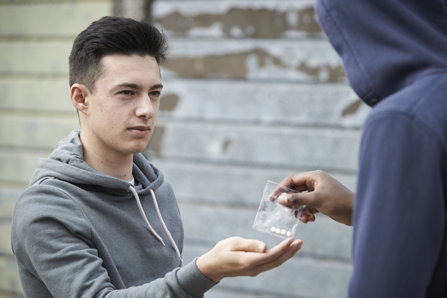Oregon Decriminalizes Drugs—How Increasing Access to Treatment is a Must

The citizens of Oregon just voted to decriminalize possession of small amounts of heroin, methamphetamine, LSD, oxycodone, and other hard drugs.
Criminalizing addicts solely for their drug use behaviors has not been the answer to the addiction problem. Society learned this the hard way with the agonizing and never-to-be-won “War on Drugs.” But this sentiment should not be used as justification to greenlight the use of addictive drugs, as could be the case with Oregon’s recent move.
In fact, Oregon’s passage of the ballot measure is not necessarily a move in the right direction at all. The ballot measure’s stated intention is that drugs will be decriminalized in Oregon, not legalized. But it is unclear whether Oregon’s new law is true decriminalization or just legalization, masquerading under the guise of decriminalization.
There are significant differences between decriminalization and legalization, which merit review. Decriminalization has its benefits, especially when treatment is made available for addicts and legalization can lead to more addiction. (more on these differences later).
Oregon already has some of the highest substance abuse rates in the country. The state’s new approach, as it stands, could make an already bad addiction situation worse. Oregon’s future does not look any brighter unless public health officials and governing bodies increase overall access to treatment for addicts in Oregon. This will take some dedicated effort, as Oregon already has some of the nation’s poorest rates of access to treatment. (Could poor treatment access be related to the high substance abuse rates?)
Oregon’s focus (and everywhere else for that matter) must be on treatment, treatment, and treatment, not on permissiveness towards drug use. Increasing access to drug treatment is the only way to make decriminalization work.

Oregon Measure 110, The Drug Decriminalization and Addiction Treatment Initiative
Oregon Measure 110, formally titled the “Drug Decriminalization and Addiction Treatment Initiative,” was passed into law in November 2020. It decriminalizes the use and possession of small amounts of drugs in Oregon. Possession of small amounts of drugs is now a civil violation, much like a traffic offense.
Citing the official data on the measure from Ballotpedia: “A ‘yes’ vote supported making personal non-commercial possession of a controlled substance no more than a Class E violation (max fine of $100 fine) and establishing a drug addiction treatment and recovery program funded in part by the state’s marijuana tax revenue and state prison savings.”
“A ‘no’ vote opposed reclassifying personal non-commercial possession of a controlled substance from a Class A misdemeanor to a Class E violation, thereby maintaining the existing maximum penalty for a Class A misdemeanor of one year in prison and a $6,250 fine.”
The ballot measure passed with 1,333,268 votes for “yes” and 947,313 votes for “no,” a pass of 58.5% of the vote.
“Drug possession is the most arrested offense in the United States, with one arrest every 23 seconds.”
As soon as the measure passed, it instantly made headlines across the country. Quoting Kassandra Frederique, the executive director of the Drug Policy Alliance, “In a historic, paradigm-shifting win and arguably the biggest blow to the war on drugs to date, Oregon voters passed Measure 110, the nation’s first all-drug decriminalization measure. This confirms a substantial shift in public support in favor of treating drug use with health services rather than criminalization. ... Drug possession is the most arrested offense in the United States, with one arrest every 23 seconds. Last night, Oregon showed the world that a more humane, compassionate approach is possible. Measure 110 will serve as a model and starting point for states across the country to decriminalize drug use.”
It is essential to really examine what decriminalizing drugs in Oregon will look like. Is Oregon’s move true decriminalization? Or is it closer to legalization?
Decriminalization and Legalization
Decriminalization and legalization are two different things.
The legalization of drugs approaches the drug issue from a supply-side perspective. It is a statement to the effect that there is nothing inherently wrong with the supply of drugs. Legalization makes the drug supply far more accessible because there is no longer a criminalizing disincentive to possess and use drugs. The supply flood gates are opened, and drug availability increases dramatically.

Legalization infers that there is nothing inherently wrong with normalizing accessibility to the supply of mind-altering drugs. It implies that these drugs are morally okay with society and that citizens should have access to them if they so choose.
Decriminalization, on the other hand, is an entirely different matter. When drugs are “decriminalized,” the focus is on the demand-side, rather than on the supply-side. Decriminalization does not seek to legalize drugs but determines that the use of drugs is not a criminal act. The goal is to remove the burdens of criminalization attendant with drug use. In its most ethical, well-intentioned form, decriminalization should also maintain that drug use is not be something to be condoned. Decriminalization of harmful drug usage should broaden access to help, care, support and assistance by removing the punitive aspect of drug criminalization.
(For more information on the difference between drug legalization and decriminalization, recommended listening includes the discussion on NPR’s On Point with Meghna Chakrabarti and drug policy experts Beau Kilmer, Kassandra Frederique, and Haven Wheelock. That podcast episode can be found on NPR’s website under the title “Why Voters are Rejecting the War on Drugs.” Their discussion centered on Ballot Measure 110 and other drug legalization and decriminalization issues).
The problem with Oregon’s recent ballot measure is that it is not clear how drug treatment will be made more available to addicts and how strongly they will be incentivized to seek that treatment. If treatment is not brought to the forefront as an absolute must for those who use drugs in Oregon, then the recent legislature will end up being more like the legalization of drugs in practice, even if it is called decriminalization in the written record. This is especially true, given the state’s poor track record regarding access to drug treatment.
Residential Treatment—The Real Solution to Drug and Alcohol Addiction
Unfortunately, the passage of Oregon’s Measure 110 is another indication that public opinion is shifting in the wrong direction as to the real dangers of drug use. Another example is the broadening drop in the perceived risks regarding cannabis, especially since its legalization in several states. When people are led to believe that there is no danger in using drugs, the deterrents disappear. This is dangerous, especially as it relates to young people and now, especially Oregon’s teenagers. Measure 110 does not specify how juveniles will be dealt with if caught with drugs, meaning there is no indication that law enforcement will inform their parents. This opens the door to peer pressure being a stronger force than parent pressure when experimenting with mind-altering drugs.
Decriminalization of drug use is an acknowledgment that drug use is a health issue, not criminal behavior. Therefore increased access to treatment is a critical element in any decriminalization effort and must immediately follow decriminalization.
In Oregon, addicts can now safely come forward to seek help without fear of incarceration. Now it behooves public health officials, the state government and local families to ensure that addicts actually do receive help. The ballot measure will have a net negative effect if an emphasis on treatment does not accompany it.
If you or someone you care about is using drugs in Oregon and cannot stop, please contact Narconon today. Use Oregon’s recent drug policy change as a reason to get help, not a reason to keep using drugs.
Sources:
- https://ballotpedia.org/Oregon_Measure_110,_Drug_Decriminalization_and_Addiction_Treatment_Initiative_(2020)
- https://www.npr.org/podcasts/510053/on-point
- https://www.opb.org/article/2020/11/04/oregon-measure-110-decriminalize-drugs/
